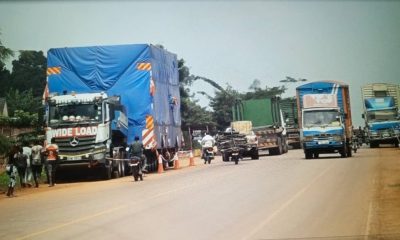News
The Exodus: Shop owners vacate Kampala
Many shop owners are now trading from carsMajority of traders in down-town Kampala are contemplating moving or have already moved out of their current merchandise shops because they cannot afford to pay the accumulated rent of four months that landlords are demanding. Others have been forced out of congested places like Owino by government’s strict social-distancing measures.
Many argue that business life in Kampala that is compounded by exorbitant rent charges, is not affordable as many consider themselves slaves of landlords.
Testimonies from a number of traders who have spoken to The Sunrise reveal that many have taken the safer option of relocating to cheaper locations on the outskirts of Kampala city towards Wakiso, after selling goodwill to new comers.
But because of the huge amount of space that is falling vacant as many move out, the value of goodwill has plummeted significantly.
According to Iddi Ssewannyana, who operates a medium sized wholesale shop in Kikuubo, the wholesale hub of Kampala, before the lock down, the goodwill value of many large wholesale shops located on the outside of buildings, ranged about US$10,000. Now however, because many places are falling vacant, coupled with the diminished fortunes in Kampala and the economy at large due to the COVID-19 pandemic, the value of goodwill has fallen by about one third to about US$7000.
He notes rather surprisingly, that some people are venturing into the shops now being vacated. He says: “We hear that many of those entering now work in government or have ties to government and they are coming with hundreds of millions of shillings to invest.”
He notes however that this is an unsustainable trend, especially if rent charges are not reduced and if the business environment remains gloomy.
“On average, a wholesale shop that deals in imported Chinese garments like clothes and ladies handbags pays between four and five million shillings a month. This means that they have accumulated rent of up to UGX20m. What owners are doing is to find buyers of the stock and are moving out because they do not see things improving in the near term to cover this kind of rent.”
Iddi says that after most landlords have refused to waive or even negotiate rent payable for the four months of the lock-down period, many tenants are choosing to sell out and move to the outskirts of Kampala.
Iddi’s experience is shared by Sylvia Nakku, who works in one of the major wholesale shops on Nabukeera Complex that import Chinese handbags. She says many traders are moving to cheaper locations in Kisenyi and out of the central business district, because they cannot afford to pay the accumulated rent.
Nakku says “A friend of mine who deals in imported Chinese garments has accumulated rent of UGX25million. Although his stock is just slightly above this figure, because of the uncertainty in the business environment that is characterised with travel restrictions in and out of the country and within, which means it is difficult to get and sell stock, he has realised that keeping up with the rent is going to be a losing game. So he’s looking for a buyer so he can chill out, and strategize when things return to normal.”
Iddi also notes that prior to the Lock down, they used to obtain merchandise on credit from manufacturers for which they would pay back in a few days after selling. Now, they no longer have this option as the manufacturers are unsure about recovering their money.
“Manufacturers used to give us things like sugar, soap and cooking oil on credit and we would pay in a few days. Now, no one is giving out things on credit.”
Indeed, as a result of the wrangles between the tenants and the landlords, Iddi says some of the traders have chosen to sell their merchandise from the boots of their cars with the help of phones to contact their regular customers.
The gloomy environment has been compounded by the fact that some of the stock got expired, or damaged during the lock down.
As the turmoil in the small and medium businesses in Kampala continues to unravel, economists and manufacturers are warning of devastating consequences to people’s livelihoods and the economy.
Ramathan Ggoobi, an economist with Makerere University Business School (MUBS) argues that the government has to find a way to allow people get back to work, especially among the environments where it is hard to social-distance.
“The government has to find a way to allow people to return to work if it has to safeguard the economy and indeed the health of the people generally. It is wrong to think that you can have life without livelihoods. The two are not mutually exclusive.”
Although the country has been under lockdown for now three months, the president has argued that the social distancing measures are not likely to be completely removed if a vaccine or drug that treats COVID-19 is not found.
Comments

























